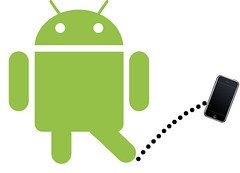 Dan Lyons, writing in Newsweek, doesn’t think the introduction of the iPhone on Verizon will stop Android’s momentum:
Dan Lyons, writing in Newsweek, doesn’t think the introduction of the iPhone on Verizon will stop Android’s momentum:
Apple’s phone would have snuffed out the Android a year ago, but now Google’s device has become an unstoppable juggernaut.
[…] “Android is a global phenomenon,” [Fred Wilson] says. “The big deal is, Android is free software, and handsets that can run it are getting super-cheap. So we are going to see a massive shift from ‘dumb phones’ to ‘smart phones’ around the world this year, and iPhone will not be the big beneficiary of that trend.”
This is exactly the mistake Apple made over twenty years ago, when it let IBM walk all over the personal computer market with its open specification. Sure, the Apple Mac popularized the idea of easy-to-use home computing, but over 90% of the machines actually sitting on peoples’ desks were IBM PC compatible. Worldwide, Mac market share is less than 5%.
I’ve complained about Android in the past, but version 2.2 changed my mind; more recently, Android-only features have been saving my bacon. It’s a great system, and its open structure allows for more innovation both in hardware and software than its competitors. To build an iPhone app, I’d need to pay to join the developer program and buy a Mac. To build an Android app, I can download the SDK and get going – no matter what kind of computer I use. That’s a real difference in attitude, and one that will ultimately see Apple’s phone devices share the fate of their desktop cousins.
Illustration: Android and iPhone by Quinn Dombrowski, released under a Creative Commons license.
Leave a Reply